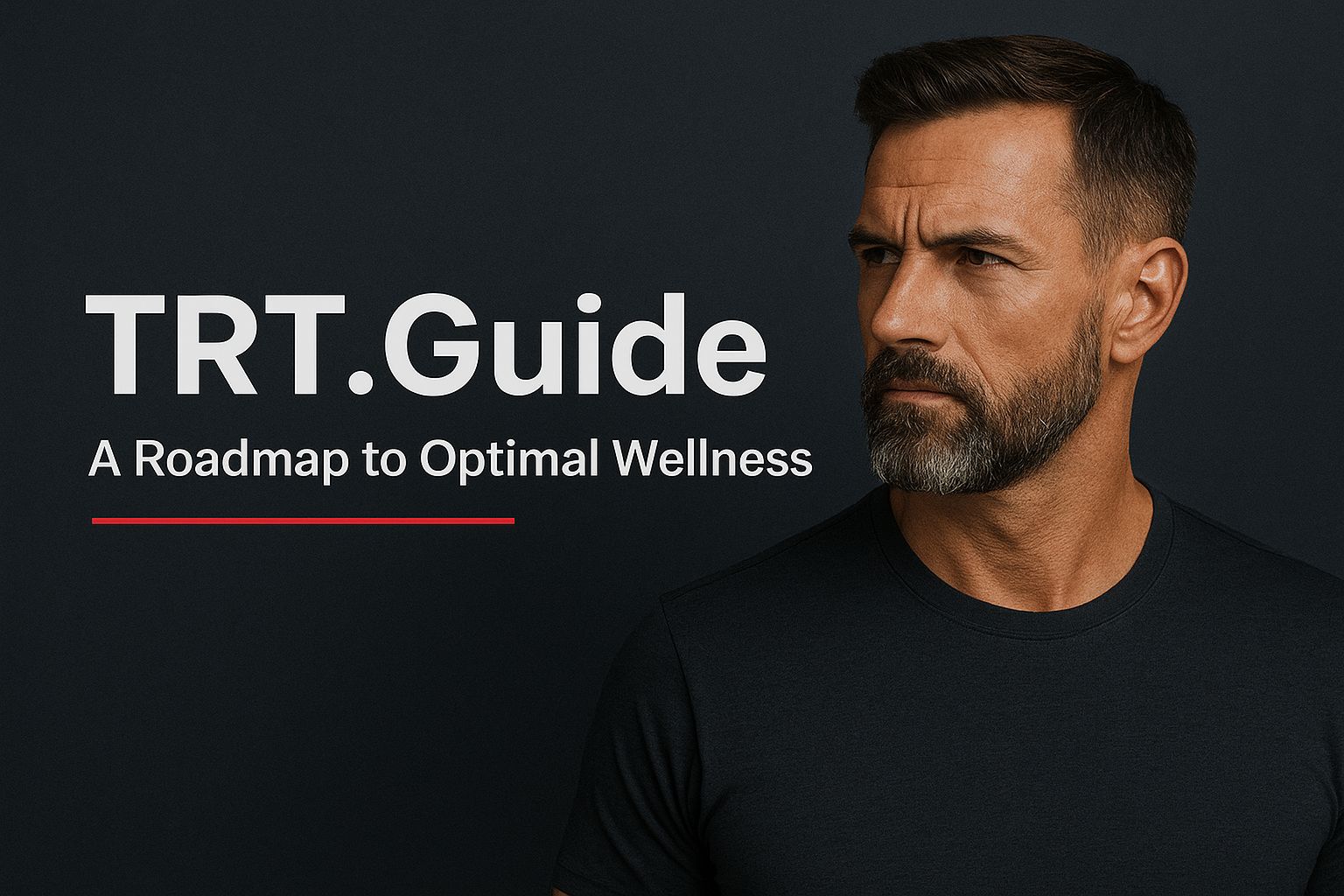Feeling tired, struggling with mood swings, or noticing a decline in your physical performance? You’re not alone. Many men in New Jersey are discovering that low testosterone levels can significantly impact their quality of life. Fortunately, testosterone replacement therapy (TRT) offers a viable solution to restore balance and vitality.
In recent years, TRT has gained popularity, providing a safe and effective way to address testosterone deficiency. With a range of treatment options available, it’s essential to understand how these therapies can benefit you. Whether you’re looking to enhance your energy levels, improve your mood, or boost your overall health, exploring testosterone replacement therapy could be the key to reclaiming your well-being.
Overview of Testosterone Replacement Therapy
Testosterone replacement therapy (TRT) addresses low testosterone levels, a condition known as hypogonadism. Hypogonadism can result from aging, medical conditions, or hormonal imbalances. Symptoms often include fatigue, mood swings, decreased libido, and reduced muscle mass. TRT aims to alleviate these symptoms by restoring testosterone to normal levels through various methods.
TRT methods include:
- Injections: Intramuscular or subcutaneous injections typically administered every one to two weeks. They provide quick restoration of testosterone levels.
- Transdermal patches: These patches deliver testosterone through the skin, applied daily. They offer a steady release of hormone for even levels throughout the day.
- Gels: Topical gels applied daily on skin surfaces. They absorb efficiently and maintain consistent hormone levels.
- Pellets: Small testosterone pellets inserted under the skin, providing long-term hormone release, generally lasting three to six months.
Safety and effectiveness are key considerations. Physicians conduct blood tests to diagnose low testosterone levels and personalize treatment plans. Regular monitoring ensures hormone levels remain within the ideal range, minimizing potential side effects.
Potential side effects of TRT can include:
- Acne or oily skin
- Increased red blood cell count
- Sleep apnea exacerbation
- Fluid retention
- Changes in cholesterol levels
Understanding the risks is essential when considering TRT. Consulting healthcare professionals in New Jersey about personalized options is vital. They evaluate medical history, assess symptoms, and perform necessary blood tests to determine the suitability of TRT.
More men in New Jersey are turning to TRT as awareness grows about its benefits. Improved energy levels, enhanced mood, and better physical performance contribute to a higher quality of life. Educational resources, including consultations and clinical studies, help individuals make informed choices about their health.
Insurance coverage for TRT varies, impacting accessibility for many. It’s important to check with providers about coverage specifics, as many plans do include treatments for low testosterone.
Investigating the right treatment options can significantly enhance well-being. Engaging with qualified providers ensures proper management and optimal health outcomes related to testosterone levels.
Benefits of Testosterone Replacement Therapy
Testosterone replacement therapy (TRT) offers several benefits, significantly improving overall health and quality of life. As more individuals in New Jersey explore TRT, understanding specific advantages becomes crucial.
Improved Energy Levels
TRT often leads to increased energy levels. Many men with low testosterone experience fatigue and decreased stamina. According to studies, testosterone therapy can elevate energy and vitality, enhancing daily function and physical performance. You may notice an improvement in endurance during workouts and daily activities. Increased energy can also lead to a more active lifestyle, which positively impacts overall health. For instance, one study showed an average increase in energy levels of around 30% in men undergoing TRT. The revitalizing effect of testosterone can help combat feelings of lethargy, making everyday tasks feel more manageable and enjoyable.
Enhanced Mood and Well-Being
TRT is linked to enhanced mood and mental well-being. Low testosterone often correlates with symptoms such as depression, irritability, and anxiety. Research indicates that men who undergo TRT experience significant improvements in mood stability and emotional resilience. You might find yourself feeling more positive, focused, and motivated in both personal and professional aspects of life. Furthermore, enhanced mood may lead to better social interactions and relationships. A study published in the Journal of Clinical Psychiatry reported that men on TRT had reduced depression scores, suggesting a substantial link between testosterone levels and mental health. Regular monitoring and adjustments by healthcare professionals can optimize these benefits, ultimately fostering a greater sense of well-being.
Considerations for Testosterone Replacement Therapy
Understanding the considerations for testosterone replacement therapy (TRT) is crucial for effectively managing low testosterone levels. This section discusses eligibility criteria and potential risks and side effects associated with TRT.
Eligibility Criteria
Eligibility for TRT typically involves specific criteria based on hormone levels and symptoms. You should undergo a medical evaluation that includes comprehensive blood tests to measure total testosterone levels. Generally, a total testosterone level below 300 ng/dL indicates a possible deficiency. Symptoms of low testosterone often weigh heavily on the eligibility decision. If you experience fatigue, mood swings, reduced libido, or decreased muscle mass, these factors may support your candidacy for treatment. It’s important to discuss any preexisting medical conditions, such as sleep apnea or prostate issues, and medications that may affect hormone levels. Age also plays a role; while low testosterone can affect men of any age, it’s more common in older adults. Consulting a qualified healthcare provider ensures that you meet all necessary criteria, leading to a personalized approach tailored to your individual needs.
Potential Risks and Side Effects
Considering the potential risks and side effects of TRT is essential before starting treatment. Common side effects may include acne, increased red blood cell count, and changes in cholesterol levels. Depending on individual responses, you might also experience mood changes or sleep disturbances. In some cases, TRT may exacerbate preexisting conditions, such as benign prostatic hyperplasia or obstructive sleep apnea. Long-term effects can include cardiovascular risks, though research shows mixed results on this topic. Regular monitoring by healthcare professionals helps manage these risks effectively. You should also engage in open discussions with your healthcare provider regarding any concerns, as they can adjust your treatment plan as necessary to mitigate side effects and improve your overall health outcomes.
Finding Providers in New Jersey
Locating qualified healthcare providers for testosterone replacement therapy (TRT) in New Jersey involves researching reputable clinics and specialists who focus on hormonal health. Understanding insurance coverage and costs is also essential for accessing these services.
Reputable Clinics and Specialists
Seek out clinics specializing in TRT, as they often employ experienced endocrinologists or urologists. Look for facilities with strong reviews and testimonials from patients who have undergone treatment. Consider clinics affiliated with recognized medical institutions, as these often follow rigorous standards for patient care. Many clinics offer comprehensive consultations, allowing for personalized treatment plans. Explore online directories, such as the American Urological Association or the Hormone Health Network, for providers with certified training in testosterone therapy. Contact prospective clinics to inquire about their experience with TRT and treatment outcomes, ensuring they prioritize ongoing patient education and support.
Insurance Coverage and Costs
Insurance coverage for TRT in New Jersey varies significantly between providers. Many plans partially cover treatment, while some may require prior authorization. Check with your insurance company to confirm coverage specifics and associated costs for lab work, consultations, and therapy methods. Expect out-of-pocket expenses if your plan does not cover TRT or if you opt for premium services. Typical costs for treatment range from $200 to $500 per month, depending on the method chosen—such as injections, patches, or gels—as well as monitoring requirements. Factor in initial evaluations and ongoing follow-ups when budgeting for TRT. Clear communication with your insurance provider and chosen clinic can help clarify any financial implications before starting therapy.
Patient Experiences and Testimonials
Patients undergoing testosterone replacement therapy (TRT) in New Jersey frequently report significant improvements in their quality of life. Many men describe increased energy levels as one of the most immediate benefits, experiencing boosts of up to 30% within weeks of starting treatment.
- Enhanced Mood: Numerous testimonials highlight improved emotional stability. Patients mention reduced irritability and anxiety, with many stating they feel more focused and productive throughout their day.
- Restored Libido: A common experience among men receiving TRT is a revived interest in sexual activity. Reports indicate substantial increases in libido and overall satisfaction in intimate relationships, contributing to enhanced emotional connections.
- Improved Physical Performance: Many individuals note a marked improvement in their physical capabilities. Testimonials describe restored stamina in workouts and daily activities, with men achieving better results in strength and endurance training.
- Recovery from Fatigue: Fatigue relief ranks high among patient feedback. Clients often remark on their renewed energy, stating they no longer feel the need for midday naps and can engage in more activities post-treatment.
Patients also emphasize the importance of personalized treatment plans. Those who underwent comprehensive medical evaluations experienced tailored therapies that suited their specific needs, further enhancing the effectiveness of TRT.
- Professional Support: Feedback frequently mentions the vital role of healthcare professionals. Patients appreciate regular monitoring and open communication, which allows for adjustments in dosage and administration methods as needed. This feedback loop leads to optimized health outcomes.
- Success Stories: Many men share their success stories, highlighting life changes resulting from TRT. They report improved relationships, better job performance, and a greater sense of overall well-being. Such positive narratives serve as powerful motivation for others considering treatment.
Some individuals also discuss challenges faced during the therapy process, such as managing side effects like mild acne or mood fluctuations. However, regular consultations with healthcare providers helped them navigate these issues effectively.
Patient experiences reinforce the notion that each journey with TRT is unique. By staying connected with healthcare professionals and sharing experiences, you can maximize the benefits of testosterone replacement therapy and take significant steps toward improved health and vitality.
Conclusion
Exploring testosterone replacement therapy in New Jersey can be a transformative step toward reclaiming your vitality. If you’re experiencing symptoms like fatigue or mood swings it’s crucial to consider how TRT might improve your quality of life. Engaging with qualified healthcare professionals ensures that you receive a personalized treatment plan tailored to your unique needs.
As you navigate this journey remember to stay informed about the options available and the importance of regular monitoring. With the right support and guidance, you can enhance your energy levels mood and overall well-being. Don’t hesitate to reach out to reputable clinics and specialists who can help you achieve the best possible outcomes from TRT. Your health is worth the investment.
Frequently Asked Questions
What are the common symptoms of low testosterone in men?
Low testosterone, or hypogonadism, can cause symptoms like fatigue, mood swings, decreased libido, and reduced muscle mass. These issues can significantly impact overall health and well-being.
What is testosterone replacement therapy (TRT)?
Testosterone replacement therapy (TRT) is a medical treatment aimed at increasing testosterone levels in men with low levels. It can address symptoms associated with testosterone deficiency and improve energy, mood, and physical performance.
What methods are available for TRT?
TRT can be administered through various methods, including injections, transdermal patches, gels, and pellets. Each method has its own benefits, frequency of administration, and suitability based on individual needs.
Is TRT safe and effective?
TRT is generally considered safe and effective when supervised by a healthcare professional. Regular monitoring through blood tests ensures treatment is tailored to the individual and helps manage potential side effects.
What are the potential side effects of TRT?
Common side effects of TRT can include acne, increased red blood cell counts, and changes in cholesterol levels. It’s essential to discuss any preexisting conditions and concerns with a healthcare provider for personalized guidance.
How can I find a qualified healthcare provider for TRT in New Jersey?
To find a qualified healthcare provider for TRT in New Jersey, research reputable clinics specializing in hormonal health. Look for experienced endocrinologists or urologists, read patient reviews, and check affiliations with recognized medical institutions.
Does insurance cover TRT?
Insurance coverage for TRT varies widely among providers. It’s important to contact your insurance company to inquire about specific coverage, costs, and any prior authorization requirements before starting treatment.
What are the costs associated with TRT?
Typical costs for TRT range from $200 to $500 per month, depending on the treatment method and monitoring involved. Understanding these financial implications helps in planning for therapy and managing healthcare expenses.
How does TRT improve quality of life for men?
Many men report significant quality-of-life improvements from TRT, such as increased energy levels, better mood stability, restored libido, and enhanced physical performance. Personalized treatment plans play a crucial role in achieving these benefits.






